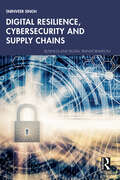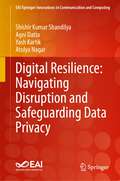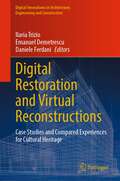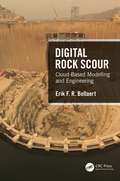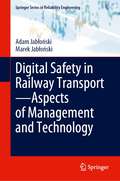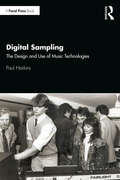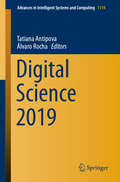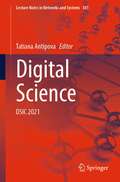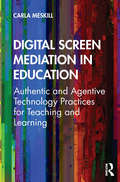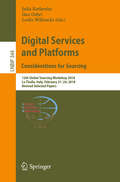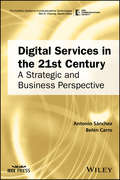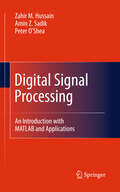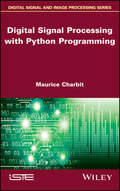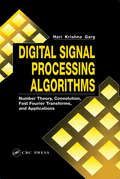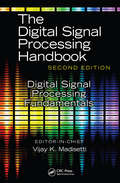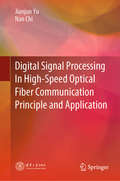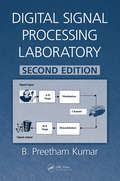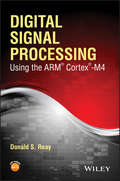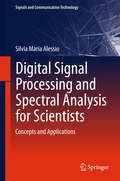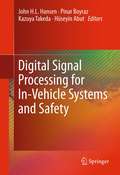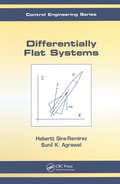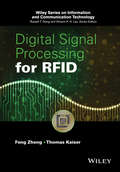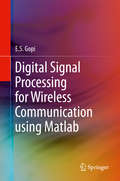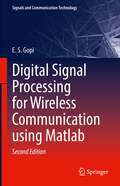- Table View
- List View
Digital Resilience, Cybersecurity and Supply Chains (Business and Digital Transformation)
by Tarnveer SinghIn the digital era, the pace of technological advancement is unprecedented, and the interconnectivity of systems and processes has reached unprecedented levels. While this interconnectivity has brought about numerous benefits, it has also introduced new risks and vulnerabilities that can potentially disrupt operations, compromise data integrity, and threaten business continuity. In today's rapidly evolving digital landscape, organisations must prioritise resilience to thrive. Digital resilience encompasses the ability to adapt, recover, and maintain operations in the face of cyber threats, operational disruptions, and supply chain challenges. As we navigate the complexities of the digital age, cultivating resilience is paramount to safeguarding our digital assets, ensuring business continuity, and fostering long-term success. Digital Resilience, Cybersecurity and Supply Chains considers the intricacies of digital resilience, its various facets, including cyber resilience, operational resilience, and supply chain resilience. Executives and business students need to understand the key challenges organisations face in building resilience and provide actionable strategies, tools, and technologies to enhance our digital resilience capabilities. This book examines real-world case studies of organisations that have successfully navigated the complexities of the digital age, providing inspiration for readers’ own resilience journeys.
Digital Resilience: Navigating Disruption and Safeguarding Data Privacy (EAI/Springer Innovations in Communication and Computing)
by Atulya Nagar Shishir Kumar Shandilya Agni Datta Yash KartikThis book offers an in-depth overview of digital resilience, defined as the ability of individuals, organizations, and societies to adapt to and counter various digital threats such as cyberattacks, data breaches, and other forms of cyber threats. Digital resilience not only enables proactive measures but also ensures fault-tolerant planning and design. The book elaborates on the necessary techniques and methods to achieve digital resilience. Key methodologies, including quantum computing, post-quantum cryptography, nature-inspired cybersecurity, zero-trust systems, zero-knowledge proofs, multi-party computation, and the emerging field of space security, are discussed in detail. The book provides insights into artificial intelligence and machine learning, examining their impact on society and organizations. It critically analyses the role of cybersecurity in businesses, emphasizing its importance for safety and economic stability. In addition, the book discusses notable cyber incidents, offering valuable insights into digital resilience. It serves as a comprehensive compilation, featuring key terms, definitions, case studies, and references to existing literature and research in cybersecurity, analytics, information sciences, future computing, digital resilience, and related fields.
Digital Restoration and Virtual Reconstructions: Case Studies and Compared Experiences for Cultural Heritage (Digital Innovations in Architecture, Engineering and Construction)
by Ilaria Trizio Emanuel Demetrescu Daniele FerdaniThis book provides the opportunity to explore the variety of meanings, undertones and contextual connotations that currently pertain to the expressions of "virtual (or digital) restoration" and "reconstruction". The book focuses on the latest applications of virtual restoration and reconstruction in different areas of Cultural Heritage through the presentation and discussion of several case studies. The goal is to provide a broad perspective on the subject. The sample presented in this book has been indeed selected and evaluated referring to different disciplinary fields such as archaeology, architecture, and conservation while encompassing a variety of cultural and chronological contexts.
Digital Rock Scour: Cloud-Based Modelling and Engineering
by Erik BollaertThis book examines the digitalization of rock scour engineering at dams and hydraulic structures. It outlines the current digitalization (technologies, applications, issues) in rock engineering, as well as the digital evolution that has strongly characterized the development of computational methods in state-of-the-art rock scour over recent years. The challenges of rock scour digitalization are also discussed, such as parametric standardization, real-time data acquisition, data analysis and interpretation, quantitative rock mass indices, new ways of thinking and digital twin implementation. Further, it presents the major components and characteristics that are needed to develop an environment that implements rock scour digitally into dam safety procedures and dam risk analyses, such as IT platforms, database availability, topology, physics, computational methods, phase coupling, accessibility, portability, reliability, real-time and ahead-of-time implementations and more.Features: Provides an overview of physics-based computational methods that have been developed by the engineering community over the last 20 years, which can easily be implemented digitally into cloud-based platforms. Offers examples of the next-generation computational environment, combining both real-time computational power and an up-to-date scour database allowing new parametric refinements. Includes several case studies of real-life rock scour. Presents the latest Digital Twin developments, which are novel and new to dam operations.
Digital Rubbish: A Natural History of Electronics
by Jennifer GabrysThis is a study of the material life of information and its devices; of electronic waste in its physical and electronic incarnations; a cultural and material mapping of the spaces where electronics in the form of both hardware and information accumulate, break down, or are stowed away. Where other studies have addressed "digital" technology through a focus on its immateriality or virtual qualities, Gabrys traces the material, spatial, cultural and political infrastructures that enable the emergence and dissolution of these technologies. In the course of her book, she explores five interrelated "spaces" where electronics fall apart: from Silicon Valley to Nasdaq, from containers bound for China to museums and archives that preserve obsolete electronics as cultural artifacts, to the landfill as material repository. Digital Rubbish: A Natural History of Electronics describes the materiality of electronics from a unique perspective, examining the multiple forms of waste that electronics create as evidence of the resources, labor, and imaginaries that are bundled into these machines. Ranging across studies of media and technology, as well as environments, geography, and design, Jennifer Gabrys draws together the far-reaching material and cultural processes that enable the making and breaking of these technologies.
Digital Safety in Railway Transport—Aspects of Management and Technology (Springer Series in Reliability Engineering)
by Adam Jabłoński Marek JabłońskiThis book introduces modern safety management in rail transport, focusing on the challenges resulting from the digital economy. It details how the cybersecurity of railway technical systems and risk can be managed. The rail transport sector is increased integrated into the digital economy. Ensuing the safety of technical systems and managing the rail system as a whole are key challenges for rail transport designers, managers, users and other stakeholders. Developing of rail transport based on the interoperability of different systems requires both searching for modern solutions and ensuring a high level of standardization of processes. In the context of the widespread digitalization of railway systems, new hazards arise that can lead to undesirable events. This book examines these issues. The book will be of interest to rail professionals, and researchers into transport systems and reliability.
Digital Sampling: The Design and Use of Music Technologies
by Paul HarkinsDigital Sampling is the first book about the design and use of sampling technologies that have shaped the sounds of popular music since the 1980s. Written in two parts, Digital Sampling begins with an exploration of the Fairlight CMI and how artists like Kate Bush and Peter Gabriel used it to sample the sounds of everyday life. It also focuses on E-mu Systems and the use of its keyboards and drum machines in hip-hop. The second part follows users across a range of musical worlds, including US/UK garage, indie folk music, and electronic music made from the sounds of sewers, war zones, and crematoriums. Using material from interviews and concepts from the field of Science and Technology Studies (STS), Digital Sampling provides a new and alternative approach to the study of sampling and is crucial reading for undergraduates, postgraduates, and researchers from a wide range of disciplines, including music technology, media, communication, and cultural studies.
Digital Science 2019: Icis 2019 (Advances in Intelligent Systems and Computing #1114)
by Álvaro Rocha Tatiana AntipovaThis book presents the proceedings of the 2019 International Conference on Digital Science (DSIC 2019), held in Limassol, Cyprus, on October 11–13, 2019. DSIC 2019 was an international forum for researchers and practitioners to present and discuss the most recent innovations, trends, results, experiences and concerns in digital science. The main goal of the conference was to efficiently disseminate original findings in the natural and social sciences, art & the humanities. The contributions in the book address the following topics: Digital Art & Humanities Digital Economics Digital Education Digital Engineering Digital Finance, Business & Banking Digital Healthcare, Hospitals & Rehabilitation Digital Media Digital Medicine, Pharma & Public Health Digital Public Administration Digital Technology & Applied Sciences Digital Virtual Reality
Digital Science: DSIC 2021 (Lecture Notes in Networks and Systems #381)
by Tatiana AntipovaThis book gathers selected papers that were submitted to the 2021 International Conference on Digital Science (DSIC 2021) that aims to make available the discussion and the publication of papers on all aspects of single and multidisciplinary research on conference topics. DSIC 2021 was held on October 15–17, 2021. An important characteristic feature of conference is the short publication time and worldwide distribution. Written by respected researchers, the book covers a range of innovative topics related to: digital economics; digital education; digital engineering; digital environmental sciences; digital finance, business and banking; digital health care, hospitals and rehabilitation; digital media; digital medicine, pharma and public health; digital public administration; digital technology and applied sciences. This book may be used for private and professional non-commercial research and classroom use (e.g., sharing the contribution by mail or in hard copy form with research colleagues for their professional non-commercial research and classroom use); for use in presentations or handouts for any level students, researchers, etc.; for the further development of authors’ scientific career (e.g., by citing, and attaching contributions to job or grant application).
Digital Screen Mediation in Education: Authentic and Agentive Technology Practices for Teaching and Learning
by Carla MeskillDigital Screen Mediation in Education explores the complex role of visual mediation in today’s digitally enhanced classrooms. While the notion that technology tools have agency—that they act to induce learning—pervades contemporary conversations about pedagogy, this unique volume reframes instructional agency around teachers. The book’s theoretically reinforced and multidisciplinary approach to enhancing effective instruction with screen-based technologies spans aesthetics, technical knowledge, teacher empowerment, social media, and beyond. Researchers in educational technology, instructional design, online learning, and digital pedagogies as well as prospective and practicing educators will find a rigorous treatment of how skilled, thoughtful teaching with, through, and around digital screens can bring about successful learning outcomes.
Digital Services and Platforms. Considerations for Sourcing: 12th Global Sourcing Workshop 2018, La Thuile, Italy, February 21–24, 2018, Revised Selected Papers (Lecture Notes in Business Information Processing #344)
by Julia Kotlarsky Ilan Oshri Leslie WillcocksThis book constitutes revised selected papers from the 12th international Global Sourcing Workshop 2018, held in La Thuile, Italy, in February 2018. The 9 contributions included were carefully reviewed and selected from 40 submissions. The book offers a review of the key topics in sourcing of services, populated with practical frameworks that serve as a tool kit to students and managers. The range of topics covered in this book is wide and diverse, offering micro and macro perspectives on successful sourcing of services. Case studies from various organizations, industries and countries are used extensively throughout the book, giving it a unique position within the current literature offering.
Digital Services in the 21st Century: A Strategic and Business Perspective
by Antonio Sánchez Belén CarroTelecommunication Services provides a holistic approach to understand telecommunications systems by addressing the emergence and domination of new digital services, consumer and economic dynamics, and the creation of content by service providers. Includes services, underlying technologies, and internal capabilities for social network advertising Covers market dynamics that determine the successes and failures of service offerings Discusses the impact of smartphones (iPhone launch) on the telecommunications and mobile device industry
Digital Signal Processing
by Peter O’shea Amin Z. Sadik Zahir M. HussainIn three parts, this book contributes to the advancement of engineering education and that serves as a general reference on digital signal processing. Part I presents the basics of analog and digital signals and systems in the time and frequency domain. It covers the core topics: convolution, transforms, filters, and random signal analysis. It also treats important applications including signal detection in noise, radar range estimation for airborne targets, binary communication systems, channel estimation, banking and financial applications, and audio effects production. Part II considers selected signal processing systems and techniques. Core topics covered are the Hilbert transformer, binary signal transmission, phase-locked loops, sigma-delta modulation, noise shaping, quantization, adaptive filters, and non-stationary signal analysis. Part III presents some selected advanced DSP topics.
Digital Signal Processing (DSP) with Python Programming
by Maurice CharbitThe parameter estimation and hypothesis testing are the basic tools in statistical inference. These techniques occur in many applications of data processing., and methods of Monte Carlo have become an essential tool to assess performance. For pedagogical purposes the book includes several computational problems and exercices. To prevent students from getting stuck on exercises, detailed corrections are provided.
Digital Signal Processing Algorithms: Number Theory, Convolution, Fast Fourier Transforms, and Applications
by Hari KrishnaDigital Signal Processing Algorithms describes computational number theory and its applications to deriving fast algorithms for digital signal processing. It demonstrates the importance of computational number theory in the design of digital signal processing algorithms and clearly describes the nature and structure of the algorithms themselves. The book has two primary focuses: first, it establishes the properties of discrete-time sequence indices and their corresponding fast algorithms; and second, it investigates the properties of the discrete-time sequences and the corresponding fast algorithms for processing these sequences.Digital Signal Processing Algorithms examines three of the most common computational tasks that occur in digital signal processing; namely, cyclic convolution, acyclic convolution, and discrete Fourier transformation. The application of number theory to deriving fast and efficient algorithms for these three and related computationally intensive tasks is clearly discussed and illustrated with examples. Its comprehensive coverage of digital signal processing, computer arithmetic, and coding theory makes Digital Signal Processing Algorithms an excellent reference for practicing engineers. The authors' intent to demystify the abstract nature of number theory and the related algebra is evident throughout the text, providing clear and precise coverage of the quickly evolving field of digital signal processing.
Digital Signal Processing Fundamentals (The Digital Signal Processing Handbook, Second Edition)
by Vijay MadisettiNow available in a three-volume set, this updated and expanded edition of the bestselling The Digital Signal Processing Handbook continues to provide the engineering community with authoritative coverage of the fundamental and specialized aspects of information-bearing signals in digital form. Encompassing essential background material, technical details, standards, and software, the second edition reflects cutting-edge information on signal processing algorithms and protocols related to speech, audio, multimedia, and video processing technology associated with standards ranging from WiMax to MP3 audio, low-power/high-performance DSPs, color image processing, and chips on video. Drawing on the experience of leading engineers, researchers, and scholars, the three-volume set contains 29 new chapters that address multimedia and Internet technologies, tomography, radar systems, architecture, standards, and future applications in speech, acoustics, video, radar, and telecommunications. Emphasizing theoretical concepts, Digital Signal Processing Fundamentals provides comprehensive coverage of the basic foundations of DSP and includes the following parts: Signals and Systems; Signal Representation and Quantization; Fourier Transforms; Digital Filtering; Statistical Signal Processing; Adaptive Filtering; Inverse Problems and Signal Reconstruction; and Time–Frequency and Multirate Signal Processing.
Digital Signal Processing In High-Speed Optical Fiber Communication Principle and Application
by Nan Chi Jianjun YuThis book presents the principles and applications of optical fiber communication based on digital signal processing (DSP) for both single and multi-carrier modulation signals. In the context of single carrier modulation, it describes DSP for linear and nonlinear optical fiber communication systems, discussing all-optical Nyquist modulation signal generation and processing, and how to use probabilistic and geometrical shaping to improve the transmission performance. For multi-carrier modulation, it examines DSP-based OFDM signal generation and detection and presents 4D and high-order modulation formats. Lastly, it demonstrates how to use artificial intelligence in optical fiber communication. As such it is a useful resource for students, researches and engineers in the field of optical fiber communication.
Digital Signal Processing Laboratory
by B. Preetham KumarConsidering the rapid evolution of digital signal processing (DSP), those studying this field require an easily understandable text that complements practical software and hardware applications with sufficient coverage of theory. Designed to keep pace with advancements in the field and elucidate lab work, Digital Signal Processing Laboratory,
Digital Signal Processing Using the ARM Cortex M4
by Donald S. ReayFeatures inexpensive ARM(R) Cortex(R)-M4 microcontroller development systems available from Texas Instruments and STMicroelectronics. This book presents a hands-on approach to teaching Digital Signal Processing (DSP) with real-time examples using the ARM(R) Cortex(R)-M4 32-bit microprocessor. Real-time examples using analog input and output signals are provided, giving visible (using an oscilloscope) and audible (using a speaker or headphones) results. Signal generators and/or audio sources, e. g. iPods, can be used to provide experimental input signals. The text also covers the fundamental concepts of digital signal processing such as analog-to-digital and digital-to-analog conversion, FIR and IIR filtering, Fourier transforms, and adaptive filtering. "Digital Signal Processing Using the ARM(R) Cortex(R)-M4: " Uses a large number of simple example programs illustrating DSP concepts in real-time, in an electrical engineering laboratory setting Includes examples for both STM32F407 Discovery and the TM4C123 Launchpad, using "Keil MDK-ARM," on a companion website Example programs for the TM4C123 Launchpad using" Code Composer Studio version 6" available on companion website "Digital Signal Processing Using the ARM(R) Cortex(R)-M4" serves as a teaching aid for university professors wishing to teach DSP using laboratory experiments, and for students or engineers wishing to study DSP using the inexpensive ARM(R) Cortex(R)-M4. Donald Reay is a lecturer in electrical engineering at Heriot-Watt University in Edinburgh, Scotland. He has also taught hands-on DSP, on a number of occasions, as a visiting lecturer at Zhejiang University in Hangzhou, China. He co-authored "Digital Signal Processing and Applications with the TMS320C6713 and TMS320C6416 DSK, Second Edition" (Wiley 2008) with Rulph Chassaing, and is the author of "Digital Signal Processing and Applications with the OMAP-L138 eXperimenter" (Wiley 2012).
Digital Signal Processing and Spectral Analysis for Scientists
by Silvia Maria AlessioThis book covers the basics of processing and spectral analysis of monovariate discrete-time signals. The approach is practical, the aim being to acquaint the reader with the indications for and drawbacks of the various methods and to highlight possible misuses. The book is rich in original ideas, visualized in new and illuminating ways, and is structured so that parts can be skipped without loss of continuity. Many examples are included, based on synthetic data and real measurements from the fields of physics, biology, medicine, macroeconomics etc. , and a complete set of MATLAB exercises requiring no previous experience of programming is provided. Prior advanced mathematical skills are not needed in order to understand the contents: a good command of basic mathematical analysis is sufficient. Where more advanced mathematical tools are necessary, they are included in an Appendix and presented in an easy-to-follow way. With this book, digital signal processing leaves the domain of engineering to address the needs of scientists and scholars in traditionally less quantitative disciplines, now facing increasing amounts of data.
Digital Signal Processing for In-Vehicle Systems and Safety
by Kazuya Takeda Hüseyin Abut Pinar Boyraz John H.L. HansenCompiled from papers of the 4th Biennial Workshop on DSP (Digital Signal Processing) for In-Vehicle Systems and Safety this edited collection features world-class experts from diverse fields focusing on integrating smart in-vehicle systems with human factors to enhance safety in automobiles. Digital Signal Processing for In-Vehicle Systems and Safety presents new approaches on how to reduce driver inattention and prevent road accidents. The material addresses DSP technologies in adaptive automobiles, in-vehicle dialogue systems, human machine interfaces, video and audio processing, and in-vehicle speech systems. The volume also features recent advances in Smart-Car technology, coverage of autonomous vehicles that drive themselves, and information on multi-sensor fusion for driver ID and robust driver monitoring. Digital Signal Processing for In-Vehicle Systems and Safety is useful for engineering researchers, students, automotive manufacturers, government foundations and engineers working in the areas of control engineering, signal processing, audio-video processing, bio-mechanics, human factors and transportation engineering.
Digital Signal Processing for Multimedia Systems (Signal Processing and Communications #Vol. 1)
by Keshab K. Parhi Takao NishitaniAddresses a wide selection of multimedia applications, programmable and custom architectures for the implementations of multimedia systems, and arithmetic architectures and design methodologies. The book covers recent applications of digital signal processing algorithms in multimedia, presents high-speed and low-priority binary and finite field arithmetic architectures, details VHDL-based implementation approaches, and more.
Digital Signal Processing for RFID
by Feng Zheng Thomas KaiserThis book discusses the fundamentals of RFID (operating principles, modulation schemes, channel models, etc.) and the state-of-the-art research results in signal processing for passive RFID; MIMO, blind source separation, interference avoidance (i.e. anti-collision), and spatial localization. The book consists of the following chapters: Introduction (overview of different automatic ID identification systems e.g. RFID, barcode, biometrics, smart cards); Chapter 2: Fundamentals of RFID systems (operating principles, passive, semi-passive, and active RFID, analog circuits for RFID, channel models, basic signal processing, and challenges); Chapter 3: Advanced modulation schemes for RFID; Chapter 4: Multiple antennas for RFID (MIMO principles, MIMO-RFID channel models, signal design, and space-time coding); Chapter 5: Blind signal processing; Chapter 6: Anti-collision for multiple RFID tags; Chapter 7: Localization with RFID.
Digital Signal Processing for Wireless Communication using Matlab
by E. S. GopiThis book examines signal processing techniques used in wireless communication illustrated by using the Matlab program. The author discusses these techniques as they relate to Doppler spread, Delay spread, Rayleigh and Rician channel modeling, rake receiver, diversity techniques, MIMO and OFDM based transmission techniques, and array signal processing. Related topics such as detection theory, Link budget, Multiple access techniques, spread spectrum, are also covered. * Illustrates signal processing techniques involved in wireless communication * Discusses multiple access techniques such as Frequency division multiple access, Time division multiple access, and Code division multiple access * Covers band pass modulation techniques such as Binary phase shift keying, Differential phase shift keying, Quadrature phase shift keying, Binary frequency shift keying, Minimum shift keying, and Gaussian minimum shift keying.
Digital Signal Processing for Wireless Communication using Matlab (Signals and Communication Technology)
by E.S. GopiThe updated book presents Matlab illustrations on various digital signal processing (DSP) techniques such as random process, time varying wireless system model, and detection and estimation theory used in wireless communication. The book also covers recent wireless techniques like OFDM, massive MIMO techniques, non-orthogonal multiple access, millimeter wave MIMO, full duplex, cognitive radio, co-operating communication, unmanned aerial vehicles etc. This book is suitable for those who are doing basic and applied research in digital signal processing for wireless communication.
